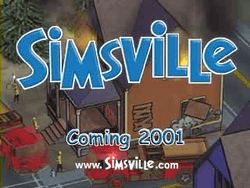SimsVille
| SimsVille | |
|---|---|
 The ending of the SimsVille trailer, displaying its stated year to be released and logo. | |
| Developer(s) | Maxis |
| Publisher(s) | Electronic Arts |
| Platform(s) | PC |
| Release date(s) | Canceled[1] |
| Genre(s) | Life simulation |
SimsVille is a cancelled 2001 game by Maxis.
The game was to offer the user control of a multitude of houses in a neighborhood in a fashion similar to The Sims. The cancellation came as Maxis decided to apply more of its staff to development of The Sims products. Many aspects of the game, such as a communal "downtown" area, were incorporated into the third expansion pack for The Sims, Hot Date. Also, several elements of SimsVille, such as obtaining feedback from citizens, were used in Maxis' next city simulation game, SimCity 4. The ability to control many households at once and the fully 3D neighborhood view format was also used in The Sims 2. Finally, the concept of a fully open world without loading screens features in The Sims 3 and MySims
The trailer can be seen on the SimCity 3000 Unlimited installation CD, as well as The Sims: Livin' Large CD and on the internet.
In March 2001, Maxis held a reception for the release of The Sims: House Party in San Francisco, California. During this reception, several of the Maxis developers demonstrated Simsville which was expected at that time to be released later that year. It received tepid response in comparison to the demonstration of House Party. One significant difference between the gameplay of The Sims and SimsVille was that where in The Sims, a player would push Sims by giving them commands to follow, but in SimsVille, a player could only pull Sims by the placement of objects with different degrees of attraction to the Sims. Objects with insufficient attraction would be ignored by sims. This new gameplay style did not allow as much player control in SimsVille as in The Sims, which contributed to its poor reception by those in attendance.
Gallery
See also
References
- ↑ "SimsVille Canceled". September 20, 2001.


